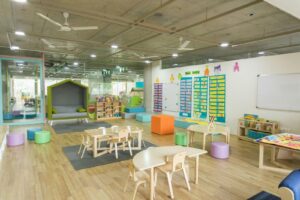 Early childhood education—or ECE—refers to pre-kindergarten programs that prepare children for grade school. They differ from typical daycare and other afterschool or childcare programs in their structure, activities, tracking, and goals for the children in their care. These programs often have lesson plans and certified instructors taking care of and teaching children the basics of life. Instead of free play, nap time and meal breaks that make up most of daycare time, kids in an ECE environment “learn the foundational skills for reading, math, self-control, and positive relationships” under the active guidance and involvement of an instructor.[1] Early childhood education programs are a foundation for “academic, social and emotional growth.”[2]
Early childhood education—or ECE—refers to pre-kindergarten programs that prepare children for grade school. They differ from typical daycare and other afterschool or childcare programs in their structure, activities, tracking, and goals for the children in their care. These programs often have lesson plans and certified instructors taking care of and teaching children the basics of life. Instead of free play, nap time and meal breaks that make up most of daycare time, kids in an ECE environment “learn the foundational skills for reading, math, self-control, and positive relationships” under the active guidance and involvement of an instructor.[1] Early childhood education programs are a foundation for “academic, social and emotional growth.”[2]
ECE programs offer a wide range of benefits for kids, from short-term effects like learning to tie their shoes or practice good hygiene throughout the day, to long-term impacts such as being more likely to attend college or contribute positively to their community. Every interaction and part of their day is meaningful towards learning. These activities are still fun for children as they are not being pushed into the rigidity of a classroom just yet. Instead, they are collecting tools and developing habits that will be helpful when they begin school. From an activity like shaping kinetic sand or other sensory play, they can develop a sense of curiosity and learn basic science skills or concepts.[2] With storytelling—whether through a reading circle or through playing with toys—and with music or dance, they can express themselves, sharpen their motor skills, and add to their vocabulary and grammar naturally.[2] As a matter of fact, “[s]tudies conducted in New Jersey, Oklahoma, Georgia, Tennessee, Boston, and Chicago found positive immediate effects on outcomes such as letter and word recognition, phonemic awareness, counting, and math knowledge.” [3]
Additional activities can be related to other cultures and languages—like learning to count to ten in Spanish—and are more often than not collaborative, which is a good jump-off point to establish and nurture trusted relationships amongst peers and educators that share different backgrounds.[2] ECE programs are also good at recognizing and meeting diverse learning needs. Accessibility and inclusivity begins early, as ECEs screen and track children’s milestones and can alert parents of potential hurdles for their children. With this, it can then recommend additional assessments to ensure they are receiving all the support they need.[4]
In terms of benefits beyond kindergarten and elementary school, early childhood education is linked to “greater success in life.”[4] Kids who had an ECE were 25% more likely to graduate high school, and four times more likely to complete a bachelor’s degree. These kids were also less likely to repeat a grade and tend to be higher earners within the workforce.[5] Parents too reap benefits from ECE programs as they then have more freedom to work, attend school, or even just take care of themselves. ECE has shown to be substantially beneficial to single-parent households, particularly low income single mothers.[4]
The main challenge with ECEs is financial accessibility. Early childhood education can be high in cost and “despite…federal programs [to subsidize cost], many children do not have sufficient access to high quality ECE.”[1] Studies have shown that not having access to these programs continues a cycle of disadvantage within marginalized communities, with kids who are unable to have an early childhood education being 60% more likely to never attend college. [6]
In addition to the financial hurdles, there are some other issues worth mentioning. The staff at some programs may lack proper certification or experience to be effective instructors, and these centers can also be understaffed with inefficient ratios.[7] Other concerns include separation anxiety for both parents and children due to being apart before they are ready, and reduced socialization due to a more controlled environment.[7] There is also the risk of exposure to more diseases and not having the sufficient resources to support children with special needs.[8]
In spite of these challenges, the benefits of early childhood education cannot be ignored, especially when its impact goes beyond the individual and affects the community as a whole.[8] Currently, there are at least three bills in Congress that would increase the quality and supply of ECE as well as lower its costs.[1] These changes would mitigate a lot of the challenges mentioned above, along with additional training, recruitment, and appropriate certifications for future educators to join these programs.
PSG
Publishing Solutions Group believes that quality education programs are crucial for lifelong success. Understanding the importance of early childhood education is important for creating impactful learning materials. Early education lays the foundation for lifelong skills in literacy, numeracy, critical thinking, and social-emotional development. Effective content must align with developmental milestones, engage young learners through play-based and interactive approaches, and support educators with adaptable resources. By prioritizing age-appropriate, inclusive, and innovative content, PSG can contribute and support its clients by shaping a strong foundation for children’s future academic and personal success. By delivering innovative and high-quality materials to our clients, we ensure young learners receive a good foundation for their future.
[1] https://www.acf.hhs.gov/opre/report/childrens-learning-and-development-benefits-high-quality-early-care-and-education
[2] https://www.apu.apus.edu/area-of-study/education/resources/why-is-early-childhood-education-important-for-children/
[3] https://files.eric.ed.gov/fulltext/ED611913.pdf
[4] https://brighterfuturesindiana.org/blog/top-five-benefits-of-early-childhood-education
[5] https://www.nea.org/advocating-for-change/action-center/our-issues/early-childhood-education
[6] https://www.piqe.org/lost-potential-the-hidden-cost-of-barriers-to-early-childhood-education/
[7] https://launchpad-ee.com/pros-and-cons-of-early-childhood-education/
[8] https://www.brooklynchildcarecollective.org/what-are-the-pros-and-cons-of-early-childhood-education
Free to use under the Unsplash License



